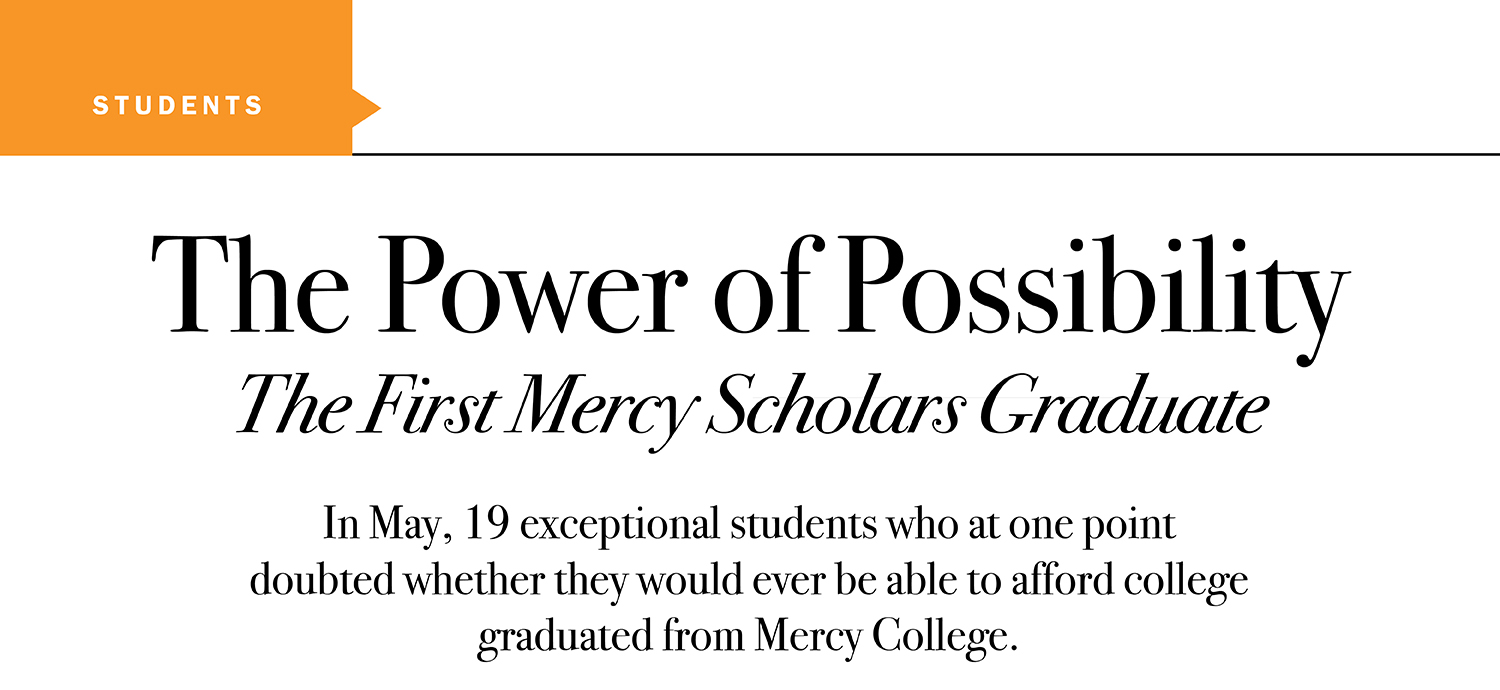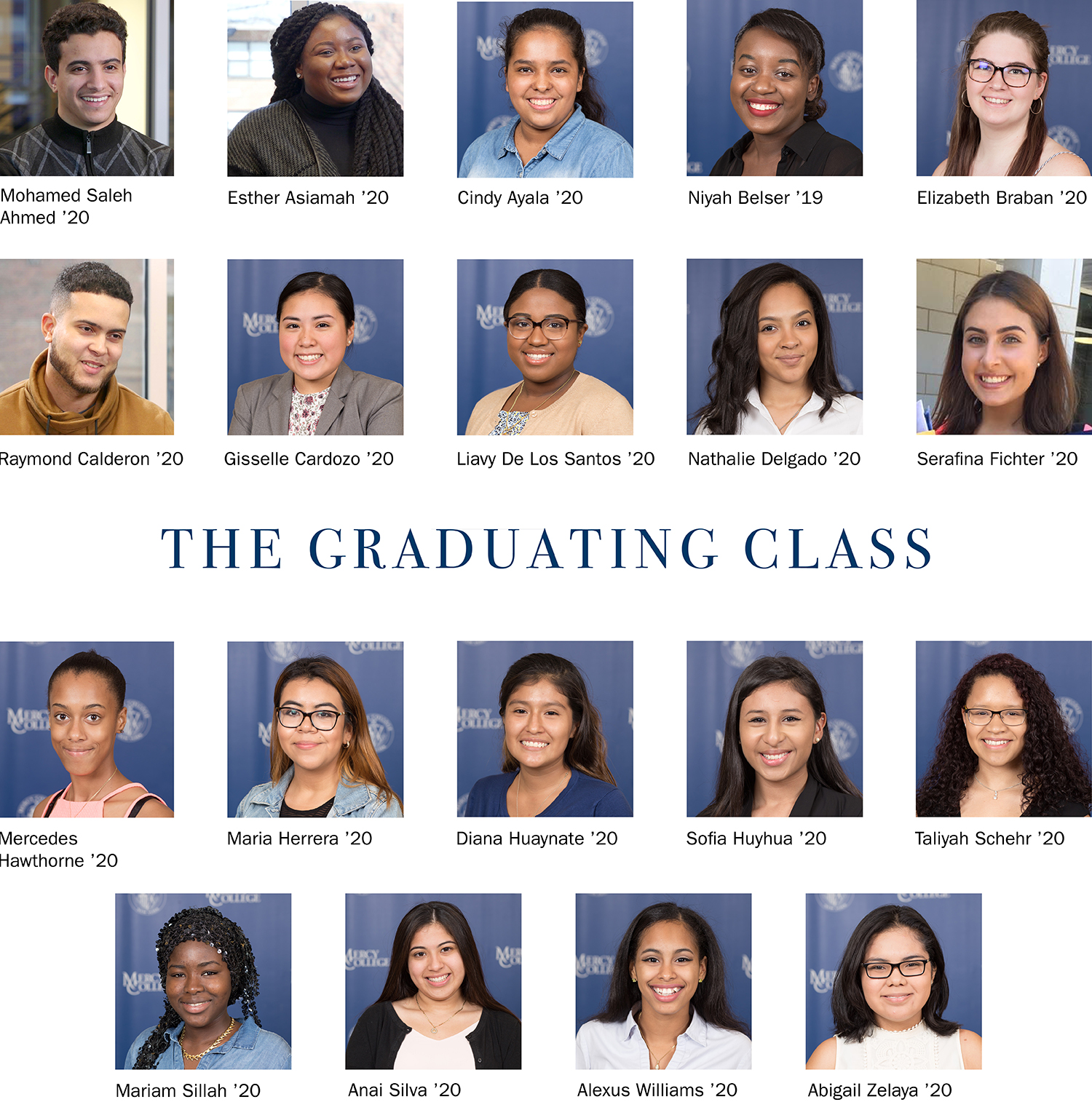
After four years of hard work, this inaugural cohort of Mercy Scholars earned their diplomas after receiving scholarships to cover tuition, books and fees to Mercy based on their academic achievement, leadership, service to others and unmet financial need. Now, they head to graduate school or into the workforce with minimal or no debt due to the generosity of donors who funded their undergraduate education.
The Mercy Scholars Program launched in 2016 with a mission described by President Tim Hall, who asked: “What would happen in the lives of students if they could come to college knowing that they would not be encumbered with draconian debt? How would that let them engage their full potential?” Inaugural donations from Bob and Kate Niehaus, Jim and Marsha McCormick and others made it possible for the program to accept its first cohort and inspired a whole host of donors who have supported and mentored a new group of students every year since.
By all accounts, the Mercy Scholars Program is a tremendous success. Each year, the program accepts 20 to 25 students, and 91% of them are on track to graduate in four years as compared with a national four-year graduation rate of 53%. Scholars work hard at Mercy, earning an average GPA of 3.27. And donors praise the fact that they can meet the students they support and follow their progress over the course of four years.
“This program is one of the most direct and purposeful ways to make a deep impact on a family,” asserted Ariana Aguilar, Mercy’s director of donor relations. “In fact, the investment comes back to these students, their families and society in multiple ways. To me, the Mercy Scholars Program is emblematic of the type of programming that can truly revolutionize higher education and make it much more accessible. We are incredibly grateful for the donors who have made this possible.”
In short, the Mercy Scholars Program transforms lives and here are three examples from this year’s graduating class: Serafina Fichter, Mohamed Saleh Ahmed and Alexus Williams.
SERAFINA FICHTER ’20
The seventh of nine children growing up in the Pelham Bay section of the Bronx, Serafina Fichter ’20 had her parents’ full support in pursuing a college education. “Even though my parents didn’t go to college, they always pushed us into the direction of this better life,” she explained. “They wanted us to have more than they did.” Yet even with their backing, four years of college tuition was still a significant financial burden for the family. “Being awarded this scholarship and sharing the news with my parents is one of my proudest memories,” she reflected.
When her beloved uncle passed away unexpectedly shortly after her freshman year at Mercy, Fichter struggled to cope with the grief at first. Eventually, she persisted with the help of her family, friends and her PACT mentor. “I am grateful that Mercy provided the environment and support that allowed me to overcome this difficult time and continue my journey,” she said. “Mercy is a place where you aren’t defined by how many times you fall but by how many times you pick yourself back up.”
Her uncle’s death inspired her to change her major from English to communication disorders so she could spend her life helping others, just as he had done. The more classes she took in her new major, the more she fell in love with the field. “Everyone deserves that chance to communicate and to be understood.” She is beginning her master’s degree in communication disorders at Mercy this fall.
“Mercy is a place where you aren’t defined by how many times
you fall but by how many times you pick yourself back up.”
Fichter appreciates what makes a Mercy education different: “The professors actually want to see you succeed. And I think that stands out from a lot of other schools that have big lecture halls where no one is raising their hands. I would never want to be in a class like that. At Mercy, the classes are so small, and I can ask questions and really know that I’m being heard.”
For her, the scholarship provided motivation to work harder and achieve more: “Having a donor is very important because it gives me something to work for. If we’re not working to our full potential, then why is someone investing so much in us? The donors have paved the way for our futures, and I promise we will do our best to make them proud and pay it forward.”
MOHAMED SELEH AHMED ’20
Reflecting on when his family immigrated to the United States from Yemen, Mohamed Saleh Ahmed ’20 said, “Back then, I didn’t have much hope. But now, I do. I have a lot of hopes.” This quiet student is the first in his family to even graduate from high school and faced pressure to start working instead of attending college. The Mercy Scholars Program made it possible for him to continue his education. “Without this scholarship, attending college would have been a tremendous challenge due to the expense and my family’s limited ability to provide financial support,” he explained.
Over the past four years, Mercy became his “second home, a family.” He enjoyed the connection and camaraderie that came with getting to know the other Mercy Scholars. “This program taught me that education is not just about getting a degree,” he explained. “It is also about forming a community and building a network of people who will challenge and inspire you to be better.”
Upon arriving at Mercy, Ahmed planned to major in biology in preparation to become a doctor. However, he was so inspired by his first legal studies class that he decided to major in legal studies and minor in criminal justice. As someone who has experienced racism because of his ethnic background, he sees law as an opportunity to be a changemaker. “I believe that becoming a lawyer will help me defend others and stand up for my people peacefully,” he said. “I will show people that Arabs do not kill and destroy people. Arabs, like me, can save people’s lives.” Even while still an undergraduate, Ahmed experienced the legal system up close by volunteering at Manhattan Housing Court as a Court Navigator, a role that enabled him to assist people who do not have an attorney during their court appearances in landlord-tenant and consumer debt cases.
“I’m here to be a role model for my younger siblings to let
them know that if I can do it, they can do it too.”
His life is on a different path because of this scholarship, and his family’s is too. “I’m here to be a role model for my younger siblings to let them know that if I can do it, they can do it too,” he said. After seeing his successes, his parents are even considering letting his sister attend high school, something that many girls in Yemen are not allowed to do. “The donors gave my family and myself the opportunity to be a success,” he said. “Now I am in the position where I can be a blessing to others because donors believed in investing in me.”
ALEXUS WILLIAMS ’20
For Alexus Williams ’20, college was never a given. Neither of her parents earned an undergraduate degree, and although she wanted to continue her education, she knew that the price tag was high — “a price tag that my family and I could not have afforded on our own.” Scholarships did not seem within reach either. As she put it, “Where I’m from, we don’t get scholarships.”
So being named a Mercy Scholar and awarded a full scholarship signified opportunity: “It shows those around me that hard work does pay off. Being a Mercy Scholar not only gives me great pride but hope that those who feel so small in a big city can do great things with determination and self-confidence.” She sees the Mercy Scholars Program as being meaningful for her entire family: “I give them a chance to live through me, to know that we did it and that the family is successful. And also, I have little siblings, so it gives them a role model to follow.”
At Mercy, Williams majored in nursing. “I love it. I can’t see myself doing anything else.” The donor who supported her education, Bruce Haber, Mercy Trustee and former Mercy Board Chair, recognizes her talent and determination: “When you meet Alexus, you know that she can succeed at whatever she wants to succeed at. Right now, she wants to be a nurse. But who knows? Maybe she’ll want to be the president of a hospital. The sky is the limit once you get the proper education and put it to good use.”
Indeed, Williams sets her sights high: “I don’t want to just make a difference. I want to be the difference. I want to make sure that not only am I successful but the others around me are successful too. I don’t want to be the only rose growing in the garden. I want to make sure that there’s a rose bush.”
These are only three of the many inspiring stories from the inaugural cohort of Mercy Scholars. We look forward to following the lives and careers of these accomplished young graduates as they go off into the world.
“I don’t want to just make a difference. I want to be the difference."
By making college a reality for students with unmet financial need, the Mercy Scholars Program transforms lives and supports Mercy’s mission of serving others and increasing access to higher education. If you are interested in learning more about supporting students in this program, please contact Chief Advancement Officer Bernadette Wade at bwade@mercy.edu or call (914) 674-7596.
_________________

“I’m grateful for the Mercy Scholars who rewrote the trajectories of their own lives by coming to the College and doing the work to graduate on time in four years. It is an extraordinary accomplishment and I promise you those habits of resilience and dedication to the work are going to pay off for you in the future.”
Timothy L. Hall
President